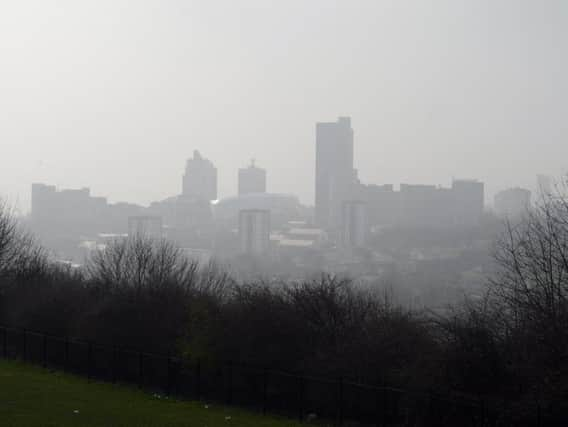Here's why Leeds City Council is asking Chancellor Sajid Javid for Clean Air Zone cash


Civic figures, including those from Leeds, are among the various nationwide bosses today urging Chancellor Sajid Javid to prioritise the issue in the upcoming new Spending Round.
Fourteen mayors and political leaders are calling on ministers to support a network of 30 new and existing Clean Air Zones, where the most polluting vehicles are fined, arguing that it would save money for the NHS.
Advertisement
Hide AdAdvertisement
Hide AdA report released by UK100, a network of local leaders, shows that towns and cities could see an economic return of £6.5bn with the support, while the Royal College of Physicians has assessed that the costs attributed to health problems resulting from exposure to air pollution are more than £20bn per year.
Leeds is introducing a Clean Air Zone - though its implementation is delayed - but it will only charge the drivers of certain types of vehicles such as buses or HGVs.
Under the UK100 plan, poorer residents and small businesses would be offered incentives of between £2,000 and £6,000 to either upgrade existing vehicles or get rid of their older, polluting ones and switch to a cleaner form of transport such as electric vehicles or public transport.
The leaders argue that a national network of zones across England, including London, could be "enhanced and unlocked" if an additional £1.5bn is committed from Government and business to tackle air pollution in the most polluted towns and cities.
Advertisement
Hide AdAdvertisement
Hide AdIt would bring together £1bn in the upcoming Spending Round alongside £500m from business contributions, allowing the zones to be introduced in all of the places the Government warns will have illegal levels of Nitrogen Dioxide (NO2) by 2021.
This includes towns and cities across the country such as Leeds - where charging systems are set to come into force, affecting certain types of vehicles such as buses and HGVs but not residents - Bristol, Coventry, Guildford, Manchester, Newcastle and Southampton.
The UK100 report calls for a "partnership with industry" to contribute to a national vehicle renewal scheme, similar to how car manufacturers have contributed to Germany's Sustainability Mobility Fund for cities.
Councillor James Lewis, Leeds City Council's executive member with responsibility for air quality said the authority is "already helping businesses affected by our Clean Air Charging Zone switch to cleaner vehicles.
Advertisement
Hide AdAdvertisement
Hide Ad"Doing so is the best way to reduce air pollution to within legal limits before the zone’s introduction.
“However there are no ‘safe’ levels of air pollution and it is vitally important that we do everything possible to protect residents from the serious health effects associated with dirty air.
“With more support from Government, local authorities could make it easier for businesses, employers and residents to help reduce air pollution by switching to cleaner vehicles or investing in sustainable travel alternatives.
“Ultimately, this would support the Government’s own long-term ambitions to transition to zero emission road transport and would also help achieve the UK’s carbon reduction targets in light of the Climate Emergency."
Advertisement
Hide AdAdvertisement
Hide AdIt comes after environment campaigners from Extinction Rebellion protested in Leeds in July, while another demonstration took place in Manchester this weekend.
A UK100 report into the impact of London’s ULEZ (Ultra Low Emissions Zone) introduced in April this year shows that the numbers of older, polluting vehicles has reduced by over a quarter.
A survey by Hitachi from earlier this year showed that a majority of the public are in favour of Clean Air Zones, with 50 per cent supporting plans to charge motorists to enter a zone, while only 22 per cent disagreed.
Advertisement
Hide AdAdvertisement
Hide AdPolly Billington, Director of UK100, a network of local leaders that campaigns on clean air, said: “Cleaning up the air in our towns and cities makes sound economic sense and this study demonstrates that. It will boost the health of our communities and save the NHS money.
"Sensible investment by national government is needed to support local authorities to take the most polluting vehicles off our roads while ensuring that the poorest in our towns and cities are not the hardest hit by pollution and measures to tackle it.”
Mayor of London Sadiq Khan described current air pollution levels as "a national crisis," adding: "Everyone deserves the right to breathe clean air and the Chancellor simply cannot afford to delay immediate action on this invisible killer.”
A Government spokesperson said: “We know the impact air pollution has on communities around the UK, which is why we are stepping up the pace and taking urgent action to improve air quality.
Advertisement
Hide AdAdvertisement
Hide Ad“We are working hard to reduce transport emissions and are already investing £3.5 billion to clean up our air, while our Clean Air Strategy has been commended by the World Health Organization as an ‘example for the rest of the world to follow’."